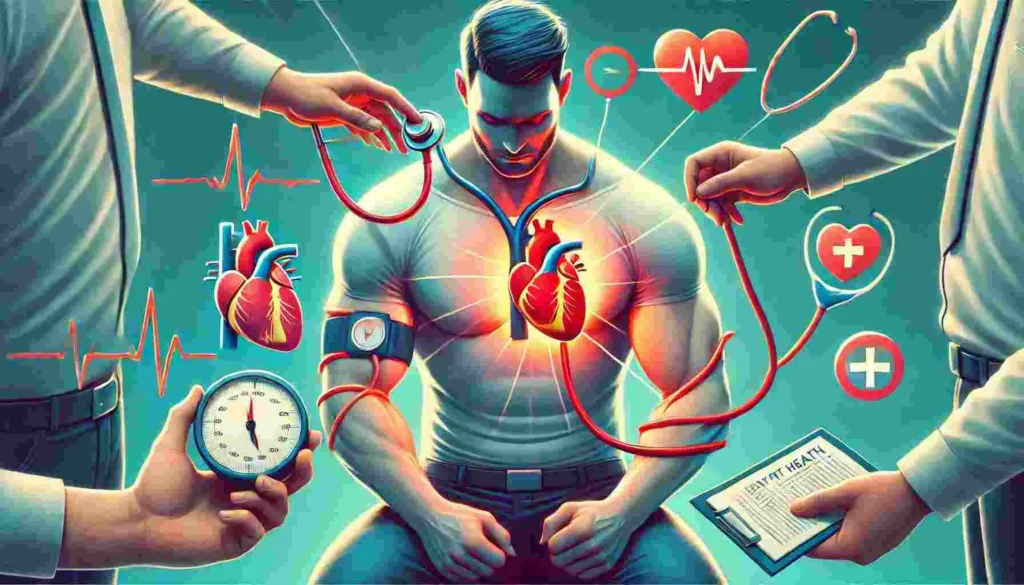
Heart Health in Men: Why You Should Start Screening Early
Introduction: The Importance of Early Heart Health Screening
Heart disease remains the leading cause of death among men globally. While it may seem like an issue to worry about later in life, the truth is that heart problems often develop silently for years before symptoms appear. Early screening for heart health can mean the difference between preventing a potential crisis and facing life-altering complications.
In this article, we’ll explore why men should prioritize early heart screenings, key risk factors to be aware of, and practical steps you can take to protect your heart health starting today.
Why Men Are at Higher Risk for Heart Disease
1. Biological Factors
Men tend to develop heart disease at a younger age compared to women. One reason is that the hormone testosterone, while beneficial for muscle and bone health, can also raise levels of bad cholesterol (LDL) and lower good cholesterol (HDL). This imbalance increases the risk of developing atherosclerosis, where fatty deposits build up in arteries.
2. Lifestyle Choices
Many men are prone to lifestyle habits that negatively impact heart health, including:
- Poor diet high in saturated fats, processed foods, and sugars.
- Lack of exercise due to busy work schedules or lack of motivation.
- High levels of stress from career and personal pressures.
- Smoking and alcohol consumption, which significantly damage heart and vascular health.
3. Reluctance to Visit the Doctor
Compared to women, men are less likely to seek regular medical checkups. This reluctance can lead to undiagnosed conditions like high blood pressure, elevated cholesterol, or diabetes — all of which are silent contributors to heart disease.
What Does Early Screening Involve?
Early screening for heart health doesn’t have to be complicated or time-consuming. Here are the key assessments typically included:
1. Blood Pressure Check
High blood pressure (hypertension) is known as the “silent killer” because it often has no noticeable symptoms. Normal blood pressure is considered 120/80 mm Hg. Regular checks help catch hypertension before it causes significant damage.
2. Cholesterol Levels
A lipid panel tests for total cholesterol, LDL (bad cholesterol), HDL (good cholesterol), and triglycerides. Elevated LDL levels are a primary risk factor for heart disease. Experts recommend starting cholesterol checks at age 20 and continuing every 4-6 years, or more often if there are risk factors.
3. Blood Sugar Test
Elevated blood glucose levels can indicate diabetes or prediabetes, both of which significantly increase heart disease risk. An A1C test measures average blood sugar over the past 2-3 months and can help detect potential issues early.
4. Body Mass Index (BMI) and Waist Circumference
Excess weight, particularly abdominal fat, is associated with a higher risk of heart disease. Measuring BMI and waist circumference provides insight into potential weight-related heart risks.
Key Reasons to Start Screening Early
1. Prevention is More Effective Than Treatment
Catching risk factors early allows for preventive measures like diet, exercise, and medication to be implemented before heart damage occurs. Prevention is always easier, more effective, and less costly than treating advanced heart disease.
2. Early Detection Can Save Your Life
Heart disease often progresses quietly. By the time symptoms like chest pain, shortness of breath, or fatigue appear, significant damage may already have occurred. Early screenings can detect warning signs and give you the chance to take action before it’s too late.
3. Identifying Hidden Risk Factors
Certain risk factors, such as high cholesterol or hypertension, may not cause noticeable symptoms. Early screenings help uncover these hidden risks so you can address them proactively.
4. Family History Matters
If your father, brother, or other male relatives have a history of heart disease, your risk increases significantly. Starting screenings early can help mitigate inherited risks and reduce the likelihood of following in their footsteps.
Understanding Key Risk Factors for Heart Disease
1. High Blood Pressure (Hypertension)
High blood pressure damages arteries, making them less flexible and more prone to blockages. Over time, this can lead to heart attacks, strokes, and other cardiovascular issues.
Tips to Manage Blood Pressure:
- Reduce sodium intake by avoiding processed and fast foods.
- Exercise regularly, aiming for at least 150 minutes of moderate activity per week.
- Limit alcohol consumption and quit smoking.
- Practice stress management techniques like meditation or deep breathing exercises.
2. Elevated Cholesterol Levels
Too much LDL (bad) cholesterol can lead to plaque buildup in your arteries, restricting blood flow and increasing the risk of heart disease.
Tips to Lower Cholesterol:
- Eat a heart-healthy diet rich in fruits, vegetables, whole grains, and lean proteins.
- Include healthy fats like avocados, nuts, and olive oil.
- Avoid trans fats and limit saturated fats found in red meats and full-fat dairy products.
3. Diabetes and Prediabetes
Men with diabetes are twice as likely to develop heart disease. High blood sugar damages blood vessels and the nerves controlling the heart.
Tips to Prevent Diabetes:
- Maintain a healthy weight through balanced nutrition and physical activity.
- Monitor blood sugar levels if you have a family history of diabetes.
- Stay active and avoid a sedentary lifestyle.
How Early is Early Enough?
Start Screenings in Your 20s
Medical experts recommend that men begin regular heart health screenings as early as their 20s. While you might not think of heart disease as a young man’s problem, risk factors can start accumulating early in life.
Recommended Screening Timeline:
- Blood Pressure: At least once every two years if normal.
- Cholesterol Levels: Every 4-6 years starting at age 20.
- Blood Sugar: Every 3 years if you are at average risk.
- BMI and Waist Circumference: Annually during routine checkups.
Benefits of a Proactive Approach to Heart Health
1. Peace of Mind
Knowing your heart health status allows you to make informed decisions. If screenings show no issues, you gain peace of mind. If they do reveal risks, you can address them early.
2. Improved Quality of Life
Taking control of your heart health through screenings and preventive measures helps you stay active, energized, and free from chronic health issues.
3. Setting a Positive Example
Being proactive with your health sets a great example for family members and friends. Your commitment to screenings can inspire others to prioritize their health.
1. Prioritize Physical Activity
Regular exercise is one of the most effective ways to maintain a healthy heart. Physical activity strengthens the heart muscle, improves blood flow, and helps manage weight.
Tips to Incorporate Exercise:
- Cardiovascular Exercise: Aim for at least 150 minutes of moderate aerobic activity or 75 minutes of vigorous activity per week. Activities like brisk walking, running, cycling, and swimming are excellent for heart health.
- Strength Training: Include strength training exercises twice a week to maintain muscle mass and reduce body fat. Weight lifting, resistance bands, and bodyweight exercises are great options.
- Stay Active Daily: Even small actions like taking the stairs instead of the elevator or walking during lunch breaks can contribute to overall fitness.
2. Adopt a Heart-Healthy Diet
Nutrition plays a critical role in heart health. A balanced diet helps control cholesterol, blood pressure, and weight, reducing the risk of heart disease.
Key Diet Tips:
- Eat More Whole Foods: Focus on fruits, vegetables, whole grains, lean proteins, and healthy fats. These foods provide essential nutrients and antioxidants that protect the heart.
- Limit Processed Foods: Reduce intake of foods high in sugar, salt, and unhealthy fats. Fast foods, processed meats, and sugary snacks can increase heart disease risk.
- Incorporate Healthy Fats: Include omega-3 fatty acids found in fatty fish like salmon, sardines, and flaxseeds. These fats reduce inflammation and support heart health.
- Watch Portion Sizes: Overeating can lead to weight gain, which puts extra strain on your heart. Practice portion control and mindful eating.
3. Manage Stress Effectively
Chronic stress contributes to heart disease by raising blood pressure, increasing inflammation, and promoting unhealthy coping behaviors like overeating or smoking.
Stress Management Strategies:
- Practice Mindfulness and Meditation: Daily meditation or mindfulness exercises can lower stress levels and improve overall well-being.
- Stay Connected: Social interactions with friends, family, or support groups can reduce feelings of isolation and stress.
- Engage in Relaxing Activities: Activities like yoga, reading, listening to music, or spending time in nature can help calm the mind.
- Seek Professional Help: If stress becomes overwhelming, consider speaking with a therapist or counselor.
Common Myths About Heart Health in Men
1. “I’m Too Young to Worry About Heart Disease”
Many men believe that heart disease only affects older individuals. However, heart problems can develop silently over decades. Early screening helps catch issues before they become serious.
2. “I Exercise, So I Don’t Need Screenings”
While regular exercise is vital for heart health, it doesn’t eliminate other risk factors like high cholesterol, high blood pressure, or family history. Screenings are necessary even for active men.
3. “If I Feel Fine, My Heart is Healthy”
Heart disease often develops without noticeable symptoms. By the time you experience chest pain or shortness of breath, the damage may already be significant. Early screenings detect hidden risks.
Warning Signs Men Should Never Ignore
Recognizing the signs of heart issues can save your life. Even if you’re young, don’t dismiss these symptoms:
1. Chest Pain or Discomfort
A classic symptom of heart issues, chest pain can feel like pressure, squeezing, or burning. If it lasts more than a few minutes or comes and goes, seek immediate medical attention.
2. Shortness of Breath
Feeling breathless during rest or minimal activity can indicate underlying heart problems. Don’t ignore it, especially if paired with chest discomfort.
3. Unexplained Fatigue
Constant tiredness that isn’t related to lack of sleep can signal heart problems. If normal activities leave you exhausted, consult a healthcare professional.
4. Pain in the Neck, Jaw, or Arm
Heart-related pain isn’t limited to the chest. Discomfort in the left arm, jaw, back, or neck can also be signs of a heart attack.
5. Dizziness or Lightheadedness
Sudden dizziness, fainting, or feeling lightheaded can indicate heart rhythm problems or low blood flow to the brain.
6. Swelling in the Legs, Ankles, or Feet
Fluid buildup can be a sign of heart failure. If you notice persistent swelling, don’t dismiss it as something minor.
The Role of Sleep in Heart Health
Why Sleep Matters
Poor sleep patterns can increase the risk of heart disease. During deep sleep, the heart rate and blood pressure drop, allowing the heart to rest and repair.
Tips for Better Sleep:
- Maintain a Consistent Sleep Schedule: Go to bed and wake up at the same time every day.
- Create a Restful Environment: Ensure your bedroom is dark, cool, and quiet.
- Limit Caffeine and Alcohol: Avoid consuming these close to bedtime, as they can disrupt sleep patterns.
- Reduce Screen Time: Turn off electronics at least an hour before bed to promote relaxation.
How to Get Started with Heart Screenings
Step 1: Schedule a Checkup
Book an appointment with your healthcare provider for a comprehensive heart health check. Discuss your family history, lifestyle, and any symptoms you’ve experienced.
Step 2: Know Your Numbers
Familiarize yourself with your key heart health metrics:
- Blood Pressure
- Cholesterol Levels
- Blood Sugar
- BMI and Waist Circumference
Step 3: Follow Your Doctor’s Recommendations
If screenings reveal risk factors, follow your doctor’s advice on lifestyle changes, medications, or further tests.
Step 4: Stay Consistent
Make heart screenings a regular part of your health routine. Consistency helps track changes and catch potential problems early. Changing the Narrative Around Men’s Health
In many cultures, men are often expected to embody strength, resilience, and independence. This societal pressure can make many men reluctant to acknowledge health issues or seek medical help. The result? A dangerous delay in addressing heart health concerns.
Why Men Avoid Screenings:
- Fear of Diagnosis: Some men worry that a potential diagnosis will make them feel weak or vulnerable.
- Time Constraints: Busy work schedules and family responsibilities often take precedence over personal health.
- Lack of Symptoms: Many men believe that if they aren’t experiencing symptoms, there’s no need for a checkup.
It’s time to change this mindset. Early heart health screenings are not a sign of weakness; they are a sign of responsibility and self-care.
Promoting Health Education Among Men
Increasing heart health awareness starts with education. Men need to understand the risks, benefits of early screening, and the consequences of ignoring potential warning signs. Health campaigns, workplace wellness programs, and community workshops can play a vital role in encouraging men to take heart health seriously.
Educational Resources to Leverage:
- Health Websites: Platforms like HealthInFix provide reliable, easy-to-understand information on heart health.
- Social Media Awareness: Sharing heart health facts and success stories on social platforms can help reach a wider audience.
- Workplace Seminars: Employers can promote heart health by offering regular health checkups and wellness seminars.
Technology and Heart Health: Wearables and Apps
The Rise of Wearable Health Devices
Modern technology offers new ways to monitor heart health on the go. Wearable devices like fitness trackers and smartwatches provide real-time data on heart rate, physical activity, and even stress levels. These tools empower men to stay aware of their heart health daily.
Popular Features of Wearables:
- Heart Rate Monitoring: Track your heart rate during exercise, rest, and sleep.
- ECG Functionality: Some devices offer electrocardiogram (ECG) readings to detect irregular heart rhythms.
- Fitness Tracking: Monitor your steps, calories burned, and workout intensity.
- Sleep Analysis: Gain insights into sleep quality, which is crucial for heart health.
Top Apps for Heart Health Management
Smartphone apps make it easier to track heart health data and adopt healthy habits. Here are a few popular options:
- MyFitnessPal: Track diet, exercise, and weight goals.
- Apple Health: Integrates with various health devices to provide a comprehensive health overview.
- Cardiogram: Offers advanced heart rate analysis and detects potential heart issues.
- Headspace: Provides guided meditation for stress management, a key factor in heart health.
By combining technology with traditional screenings, men can take a proactive approach to heart health.
Involving Family and Friends in Heart Health
The Role of Family Support
Family support plays a crucial role in maintaining heart health. Spouses, partners, children, and friends can encourage regular checkups, healthy eating, and physical activity.
Ways Families Can Support Heart Health:
- Cook Heart-Healthy Meals Together: Preparing meals rich in vegetables, whole grains, and lean proteins benefits the entire family.
- Exercise as a Group: Family walks, bike rides, or gym sessions make exercise more enjoyable and sustainable.
- Encourage Open Conversations: Discussing health concerns openly reduces stigma and encourages proactive care.
Setting Healthy Goals as a Team
Setting joint health goals with friends or family members can boost motivation. Whether it’s participating in a charity run, committing to a monthly health check, or reducing sodium intake together, teamwork makes heart health more achievable.
Preventive Care: Your Long-Term Heart Health Strategy
Regular Screenings for Lifelong Protection
Preventive care isn’t a one-time effort — it’s a lifelong strategy. As men age, the risk of heart disease increases, making regular screenings even more essential.
Screening Frequency by Age:
- 20s and 30s:
- Blood pressure: Every 2 years if normal.
- Cholesterol: Every 4-6 years.
- Blood sugar: Every 3 years.
- 40s and 50s:
- Blood pressure: Annually or as recommended.
- Cholesterol: Every 1-2 years if risk factors are present.
- Blood sugar: Annually if at risk for diabetes.
- 60 and Older:
- Regular heart exams, including ECG and stress tests if recommended by your doctor.
Vaccinations and Heart Health
Some vaccines, like the flu shot, play a role in heart health. Influenza can increase inflammation in the body, putting stress on the heart. Annual flu vaccinations can reduce the risk of heart-related complications.
Creating a Personalized Heart Health Plan
Step 1: Assess Your Risk Factors
Discuss your family history, lifestyle habits, and current health status with your doctor to identify your risk level.
Step 2: Set Achievable Goals
Set specific, realistic goals like:
- Walking 10,000 steps daily.
- Reducing sodium intake by 50%.
- Losing 10 pounds over 6 months.
Step 3: Track Your Progress
Use a journal, app, or wearable device to monitor your heart health metrics and progress toward goals.
Step 4: Adjust as Needed
Heart health is a journey. Regularly review your plan with your doctor and make adjustments as needed.
Building a Legacy of Health
Lead by Example
By taking charge of your heart health, you inspire those around you — sons, nephews, friends, and coworkers — to do the same. Breaking the cycle of neglect and promoting a culture of health awareness can lead to healthier generations.
The Ripple Effect of Healthy Choices
When men prioritize their heart health, the benefits extend beyond themselves. Healthier men mean stronger families, communities, and workplaces.
Key Takeaways: Protecting Your Heart Starts Now
- Early screening saves lives. Don’t wait for symptoms to take action.
- Lifestyle changes matter. Exercise, diet, and stress management are powerful tools.
- Technology can help. Wearables and apps make heart health monitoring easier.
- Family support is crucial. Involve your loved ones in your health journey.
- Stay consistent. Heart health is a lifelong commitment, not a one-time task.
Your heart is one of your most valuable assets — protect it, cherish it, and invest in its long-term health. The time to act is now.



